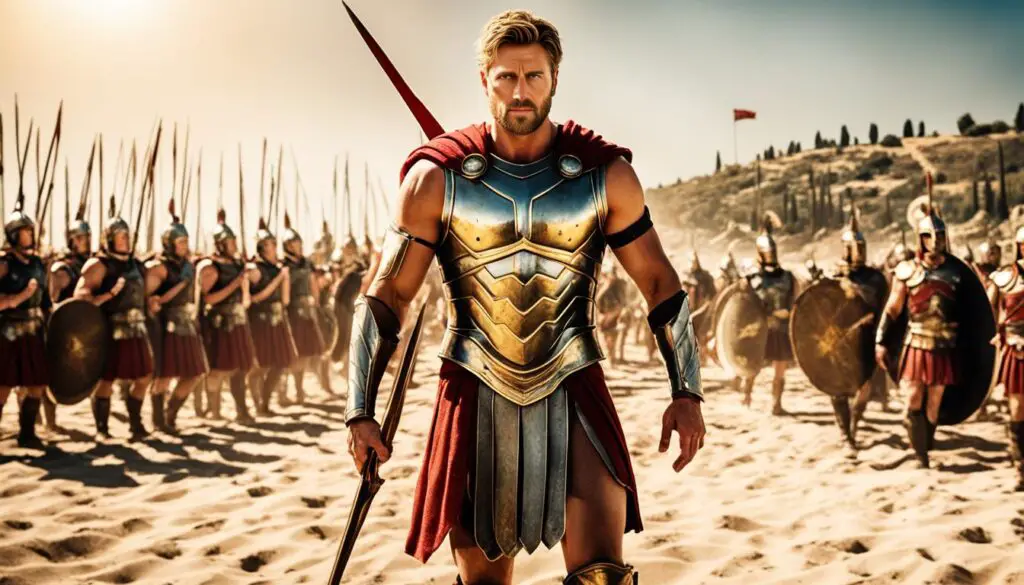Achilles is a key name in Greek mythology thanks to the Iliad. He was born to Peleus and Thetis, known as the bravest in Agamemnon’s forces.
His killing skills were developed by Chiron, the wise centaur. They trained together on Mount Pelion. doesn’t say how he died.
But it’s said that he was hit by a fatal arrow from Paris, controlled by Apollo. This piece looks deeper into the biography of Achilles.
It discusses his heroism, his vital part in the war, and how he lives on in the history of Achilles.
Key Takeaways
- Achilles is famed for his amazing battle skills.
- Thetis made Achilles immune to harm, but she forgot his heel.
- Achilles got really angry when Briseis was taken from him.
- In the Iliad, Achilles’ victory over Hector is very important.
- An arrow from Paris, with Apollo’s help, ended Achilles’ life.
Introduction to Achilles’ Legendary Status
Achilles is famous for being both a great warrior and a man with a tragic flaw. This makes him a key figure in Homer’s epic, “The Iliad”.
His actions not only shape the story of the Trojan War but also its ending.
Achilles’ decision to stop fighting puts his fellow Greeks in danger. In the first book, when he asks the gods to punish the Greeks, we see his angry nature.
Even though Agamemnon tries to make amends, Achilles stays away, showing his lasting anger.
His unmatched strength is clear when he avenges Patroclus’s death by defeating many Trojans.
Indeed, Achilles stands out as one of the top heroes in Greek tales. He is known for his victories in battle, especially his win against Hector.
Stories about Achilles go beyond “The Iliad”. He was born to a mortal king and a sea goddess, gaining only one weak spot on his heel.
This spot, his heel, becomes known as his only vulnerability.
Another tale involves Achilles defeating Penthesilea, the Amazon Queen. He also plays a role in the sacrificial story of Troilus.
These stories show his key part in the Trojan War.
Even outside of Homer’s writing, Achilles is remembered vividly. There are more than 150 pieces of ancient art showing him.
One notable portrait is of him and Ajax playing a game during the war. This shows his human side, emphasizing his friendships.
Early Life and Mythical Birth of Achilles
In the rich world of Greek mythology, Achilles’ early life stands out. He was born to King Peleus and the sea nymph Thetis.
Thetis wanted her son to be immortal. So, she did special things to him, such as burning him over fire at night and dipping him in the River Styx.
This made him invincible, except for his heel.
The Parents of Achilles: Peleus and Thetis
Peleus and Thetis’s marriage was special and full of divine influence. Zeus and Poseidon both wanted Thetis, but they stopped when they learned about the prophecy.
It said Thetis’s son would be greater than his father. Their son, Achilles, became known for his bravery mixed with godly strength.
His story is a cornerstone of Greek mythology, famous for his hero acts and his tragic end.
The Prophecy Surrounding Achilles’ Life
Achilles was destined for a special life from his birth, surrounded by prophecy. A seer predicted he would live to be uneventful or gain everlasting fame by dying young.
This prophecy worried Thetis, his mother, who tried her best to keep him safe. But when Achilles was nine, a new prophecy said he would die fighting the Trojans.
Thetis tried to keep him safe by hiding him as a girl. However, fate guided him to Troy, where his actions became legendary.
The Concept of Achilles’ Heel
The story of Achilles’ heel begins with a plan to make him unbeatable. His mother dipped him into the River Styx to make him immortal.
But she held him by the heel, leaving that spot vulnerable. Now, we use “Achilles heel” to talk about a big weakness in something strong.
The first known reference to Achilles’ tendon was in 1693 by Philip Verheyen.
Origin of the Achilles’ Heel Myth
The term “Achilles heel” was first used in 1840, long after tales of Achilles were told. In different stories, his weak point was said to be his heel, ankle, or torso.
The Iliad by Homer does not detail Achilles’ death, but later writers said it was his heel.
Symbolism and Modern Usage
The idea that everyone has a hidden weakness is shown through Achilles’ heel. This symbol is widely used in stories, culture, and even in our tech and sports.
For instance, poor battery life in gadgets is seen as their Achilles heel. The same goes for a basketball team that’s not good at free throws.
The notion of a hero with one critical flaw is seen in various myths besides Achilles. This idea is popular across different cultures and ages.
Experts often discuss Achilles’ death in detail, showing how this story remains relevant in our understanding of myth and human nature.
Achilles in Greek Mythology
Achilles is a key figure in Greek mythology, admired for his part in the Trojan War. His tale is described in Homer’s Iliad and other writings.
These stories tell of his incredible achievements.
Depiction in Homer’s Iliad
In Homer’s Iliad, Achilles stands out for his strength in battle. However, he fights an inner battle too.
The poem shows his conflict between his duty and his personal struggles.
Achilles starts the Iliad angry with his leader, Agamemnon. He stops fighting, which puts his side’s victory at risk.
Yet, his anger drives him to avenge his friend’s death and kill the Trojan leader, Hector.
Other Classical Sources on Achilles
Many other texts also talk about Achilles. Some tales highlight his victories, like defeating the Amazon queen.
They show his unbeatable fighting skills.
Achilles was taught by Chiron, a centaur, who shaped him into a hero. Sadly, he met his end in Troy, killed by Paris.
This marked the end of his legendary journey, where he was known not just for his battles but for his beauty and special armor too.
The myths around Achilles’ feats and his one weak point, his heel, continue to fascinate.
The story includes his mother’s efforts to make him immortal, his hiding, and how his death was avenged.
This epic tale is also captured in the Odyssey, sealing Achilles’ as a true hero.
who was Achilles
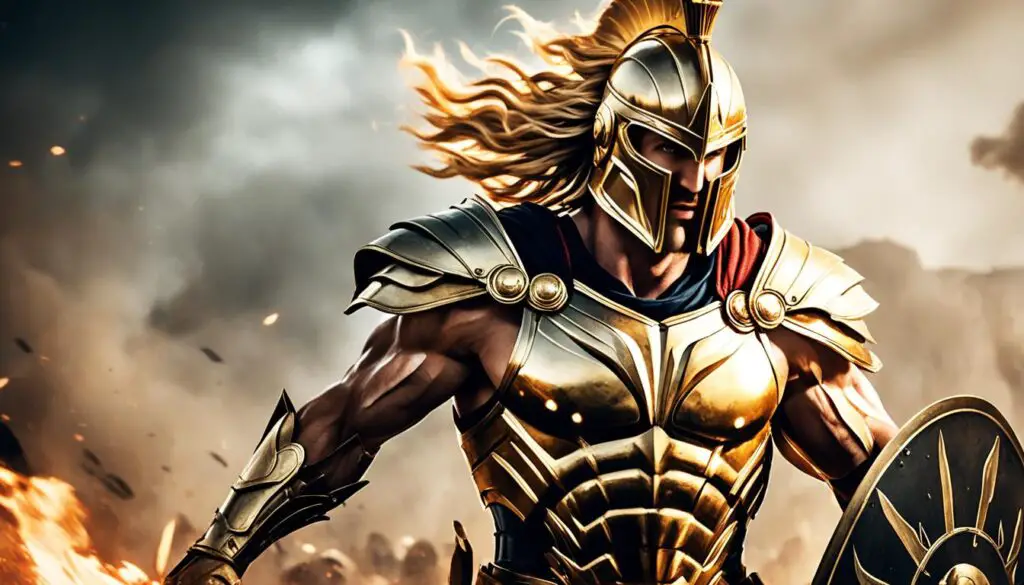
Achilles is a key figure in Greek mythology. He’s famous for his fighting skills and deep personality.
His parents were Peleus, a human, and Thetis, a sea nymph. This mix made him a strong warrior right from the start.
Legends say his mom dipped him in the river Styx to make him almost invincible. This process left his heel as his only weak spot, a flaw that played a vital role in his story.
Achilles’ Role in the Trojan War
In the Trojan War, Achilles played a crucial part. He was the fastest and best-looking hero among the Greeks at Troy.
Achilles led his warriors, the Myrmidons, fearlessly. He learned from the wise centaur Chiron, not only becoming a great fighter but a smart military leader.
Yet, things went bad for the Greeks when Achilles got angry with King Agamemnon. He stopped fighting after a disagreement about a slave girl, Briseis.
This pause was harmful to the Greek army.
After his friend Patroclus was killed by Hector, Achilles was filled with rage. This led to a critical moment in the war.
Achilles faced Hector and killed him, getting revenge for Patroclus and sealing his own fate to die soon after.
Character Traits and Heroic Qualities
To truly know Achilles, we must see his many sides. Yes, he was an amazing fighter and very brave. But he was also a hero who felt things deeply.
His story reveals his strong loyalty and his moments of unstoppable anger. When Patroclus died, Achilles showed deep sorrow by throwing games in his friend’s honor and crying in public.
Achilles’ tale is not just about fighting. It speaks to all of us about going beyond our limits. Even with his almost perfect body, his heel stayed as his only weak point.
This mix of strength and weakness keeps him as an important symbol, both in ancient times and today. His story still moves people and inspires them to face challenges head on.
The Trojan War: A Catalyst for Achilles’ Heroism
The Trojan War began when Helen was taken, leading to a conflict. This war shaped Achilles into a celebrated hero.
He faced the Greeks against the Trojans, proving his incredible strength and courage.
The Abduction of Helen and War’s Outbreak
The war started after Helen was kidnapped. Achilles, known for his unmatched fighting skills, became crucial to the Greek side.
This marked the start of a decade-long struggle that made Achilles a legendary figure.
Achilles’ Valor in the Trojan Campaign
Achilles distinguished himself with his bravery on many battlefields. He was central to the Greek’s success, but his absence brought them misfortune.
Achilles’ only weakness was his heel, as his mother made him nearly invincible.
His battle with a river god and his fight with Hector highlighted his unmatched ferocity. The duel with Hector ended tragically for Hector, a turning point in the war.
This event was a key part of Achilles’ story.
Achilles’ fury and his revenge for Patroclus are key elements of his heroism. After these acts, he was asked by Zeus to show mercy.
This moment shows the conflict between fate and choice in Achilles’ life.
The story of Achilles, a hero with both glory and sorrow, fascinates many. Scholars study his tale, diving deep into its meaning.
The story reflects on humanity’s struggle with destiny and decision.
Achilles’ Conflict with Agamemnon
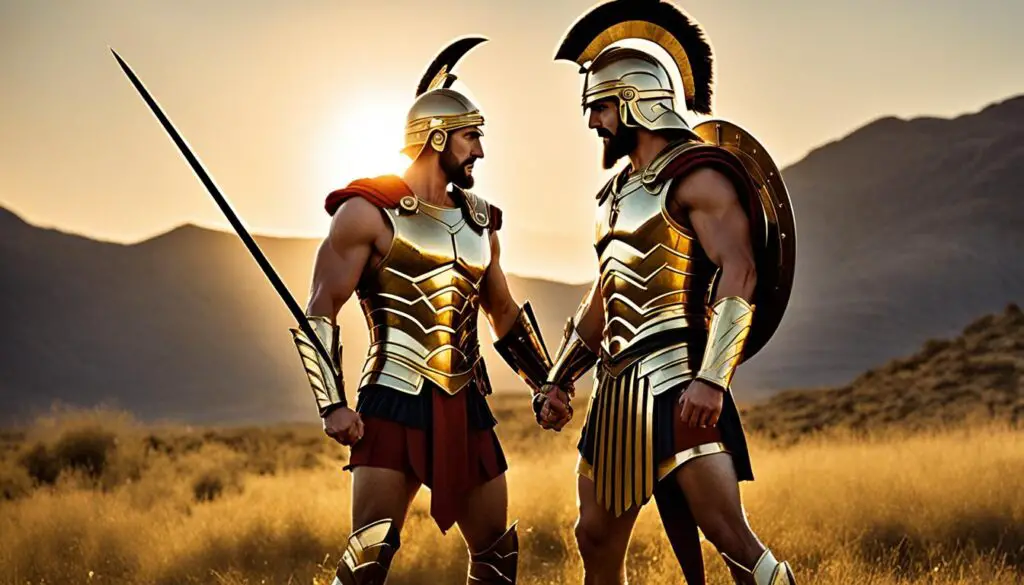
The tension between Achilles and Agamemnon is a key moment in the epic of the Trojan War. It started when Agamemnon took Briseis.
She was a war prize that belonged to Achilles. This insult deeply dishonored Achilles. He then decided to stop fighting.
The Dispute Over Briseis
The heart of the problem was the clash between Achilles’s pride and Agamemnon’s power. Agamemnon’s act felt like a direct hit on Achilles’s honor. Achilles thought Briseis should be with him, showing how important honor was to him.
It wasn’t just about Briseis but about pride and ego. Agamemnon wanted to show he was in charge. Achilles, on the other hand, valued his heroism and warrior status more. This shows their very different views on what makes a person powerful and excellent.
This conflict between the two real heroes affected the whole Greek army. When Achilles left the fight, it changed the Trojan War. The fight over Briseis had a big impact on the war and those around them.
The Death and Revenge of Patroclus
Achilles’ tie with Patroclus is fundamental in his story, showing deep friendship and maybe more.
Patroclus meant a lot to Achilles, impacting his life greatly. Ancient views differ on their relationship, with some seeing it as beyond friendship.
The Role of Patroclus in Achilles’ Life
Historians like Aeschylus and Plato saw Achilles and Patroclus as lovers. They fit into an Athenian love tradition where Achilles might have been seen as younger, and Patroclus, the elder.
Plato’s Symposium suggests this, highlighting Achilles’ beauty and Patroclus being his protector.
Pseudo-Apollodorus took a different view, seeing Patroclus more like a brother given to Achilles’ father. This view emphasizes their deep bond.
Their loyalty is famous and shown by Alexander the Great honoring their joint tomb. This act deepened their legend.
Patroclus’ death changes Achilles, fueling his mission against the Trojans. His quest for revenge against Hector shows his deep emotional ties.
This event, combined with their close relationship, highlights Achilles’ passionate nature and the complexities of his connections.
How their story is told varies, with some focusing on their close friendship. For centuries, debates about the nature of their love have continued.
This complex bond adds a critical element to the Achilles myth, whether viewed with romantic or loyal eyes.
The Clash with Hector
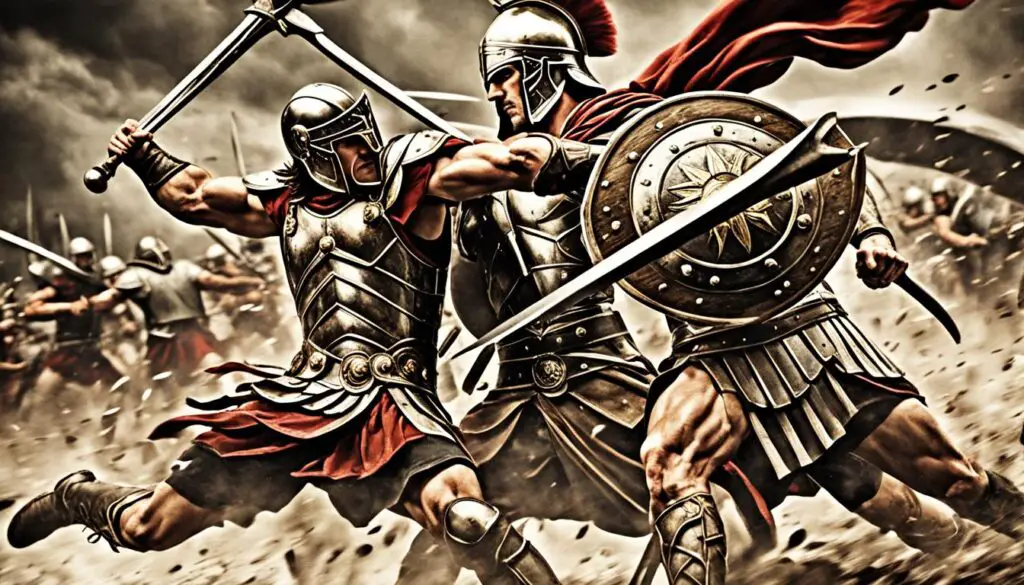
The big fight between Achilles and Hector changed everything in the Achilles history and the Battle of Troy.
It was more than just a fight at Troy’s gates. It was a test of honor, revenge, and what fate had in store for both men.
Battle at the Gates of Troy
The Trojan War went on for ten hard years. Many battles were fought, but none like when Achilles fought Hector.
Achilles was really upset after Hector killed his friend Patroclus. He fought Hector like a man possessed, filled with an anger that couldn’t be stopped.
Poseidon helped the Greeks, which made the fight more complex with the gods involved.
Fueled by grief and a need to avenge Patroclus, Achilles chased Hector around Troy three times. They finally faced off at the city’s gates.
Achilles’ Vengeance on Hector
Full of a desire for revenge, Achilles and Hector fought. It was a fierce battle. Though Hector fought well, Achilles was just too strong.
Achilles killed Hector with a spear, ending the fight.
This wasn’t the sad end, though. Achilles then dishonored Hector by dragging his body around Troy.
This shocked everyone, making King Priam very sad. In the end, Hector’s body was returned, making the Trojans even sadder.
Achilles’ New Armor from Hephaestus
After Patroclus died and Achilles forgave Agamemnon, Hephaestus made him new armor.
This special armor was very important in Achilles’ story. It gave him new strength to fight again.
In the Iliad by Homer, Achilles gets a new shield from Hephaestus. The shield is the first well-known example of ekphrasis.
It’s described in great detail, showing glorious scenes of the world.
Scholars say the shield shows a little world of its own. It has pictures of peace and war, showing life’s complexity.
This includes earth, sky, sea, stars, cities, battles, farms, and dances. It shows what ancient Greeks thought of their world.
The shield inspired many artists and authors. They all tried to capture its beauty. In the Iliad, the shield is seen as a work of art.
It hints at what’s to come for Achilles.
Achilles had two different sets of armor in the war. The first set was his father’s, and the second was from Hephaestus.
The second set was magical. It was so strong, no enemy could harm him through it.
Today, people still love seeing Achilles’ armor in art. This armor keeps inspiring stories, both old and new. It shows how famous and interesting Achilles is, along with his amazing armor.
Achilles’ Death and its Aftermath
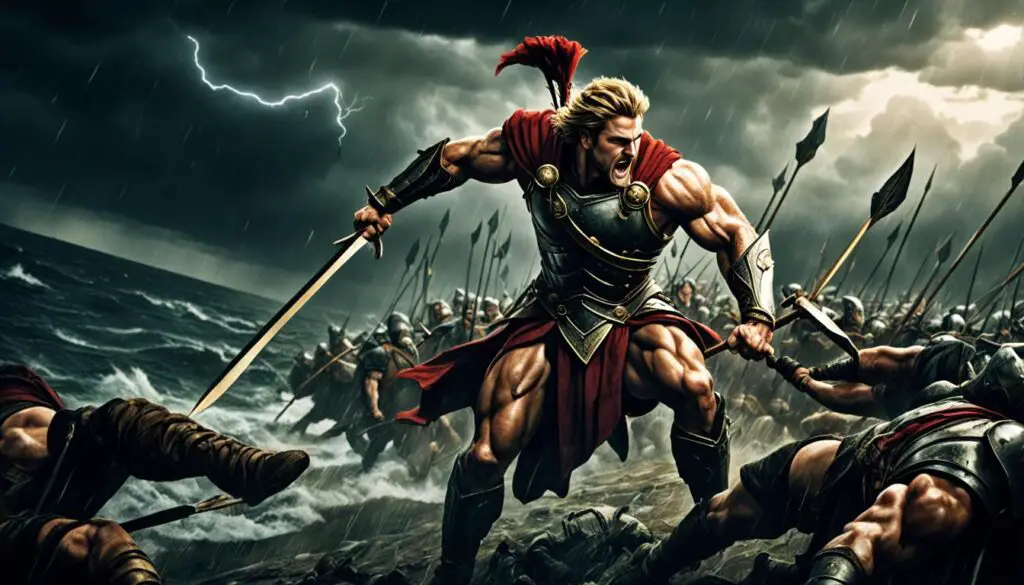
Achilles’ death changed the Trojan War’s path forever. It occurred as told by the Iliad from the 8th century B.C. Homer’s Odyssey also elaborated on this event.
A valuable lesson came when Paris, Apollo’s aid, killed Achilles by shooting his heel. This was a key moment, not just for Achilles but also for the Greek side.
Paris and the Arrow Guided by Apollo
The start of the Trojan War about 1250 BCE showed Achilles’ unmatched skill in battle. But, he met his end when Paris, helped by Apollo, aimed at his weak spot.
Studies like Burgess’ dig into the reasons behind Achilles death, exploring how Homeric texts use motifs.
This life-changing event emphasizes mortal weakness, even for the greatest of heroes.
Legacy and Funeral of Achilles
Achilles left a lasting mark through ancient myths and newer reimagining. His death led to a fierce contest over his armor.
His funeral, detailed in the Odyssey, marked the end of an epic life. In both the Epic Cycle and other writings, Achilles’ funeral was a grand affair.
It honored his bravery and sacrifices during war, spotlighting the true hero within him.
Achilles as a Tragic Hero
In Greek myths, Achilles is a key example of a tragic hero. He was a strong warrior. But his story shows both greatness and a weak point.
This weak point, known as a tragic flaw, is often seen as excessive pride. This pride is what causes his downfall, following the Greek idea of hamartia.
Analysis of Achilles’ Tragic Flaws
Looking deeper, Achilles has many sides to his character. He’s known for being unbeatable and brave. But his need for more fame can be seen as a flaw.
In The Iliad, Achilles is seen almost as a god. Yet, he knows he will die, unlike the gods. His anger towards Agamemnon and the fight over Briseis shows his destructive side.
A big part of Achilles’ story is his inner battle. He longs for eternal fame but also wants a simple life.
We see his human side when he mourns Patroclus’ death. This makes his story about being a hero truly moving, despite his tragic end.
Achilles dies in a surprising way, not in a big fight but with a single arrow to his heel. This ending highlights his vulnerability, which is a key theme in his story.
It’s a lesson in how even the greatest heroes have their weak spots.
Modern Interpretations and Adaptations
Achilles’ tale has moved beyond old texts into today’s novels and movies, re-imagining his role for new eyes.
These modern interpretations of Achilles dive into themes like heroism, honor, and the human condition.
They show us how his story is still alive in our culture and minds.
Representations in Literature and Film
In 2011, Madeline Miller released her novel, “The Song of Achilles”, after a decade of work.
It quickly became a hit, earning awards like the Orange Prize for Fiction. One key focus was Achilles’ bond with Patroclus, offering a fresh look at gay love.
The book broke stereotypes and showed a deep, equal love between the two.
Now, books like Stephen Fry’s and Rick Riordan’s myth series are beloved by many. They show the ongoing appeal of Greek mythology in today’s culture.
They’ve sparked a new wave of myth retellings in books and movies.
“Troy” (2004) featured Brad Pitt as Achilles, a memorable role for many.
This and other films refresh the hero’s saga for today’s viewers, discussing topics like toxic masculinity.
They celebrate his strengths, making him more relatable to new audiences.
In the classroom, teachers use these modern stories to link ancient themes with today’s world.
They help students see the timeless truths in both old and new tales. This approach helps learners see how to learn from the past and find new ways forward.
Achilles’ Legacy in Ancient and Modern Culture
The Achilles story goes way beyond old poems. It has touched many generations of Greek heroes.
It’s still found in stories, art, and today’s media. His tale shapes what we think of as heroics and talks about being brave and the struggles of ancient and now.
Influence on Later Greek Heroes
Achilles was super brave and nearly unbeatable. This made him a role model for later heroes like Odysseus and Ajax.
Even though he had a weak spot, his courage during the Trojan War set a major standard for heroism.
His battles show both his strength and his weak point. This mixof power and vulnerability is a key theme in many Greek stories.
- Achilles’ winning fight with Hector shows his might as a warrior in the toughest fights.
- In the Trojan War, he led attacks and won in one-on-one battles, setting the example for future Greek soldiers.
Cultural References and Continued Influence
Achilles’ effect goes past myths, influencing arts and modern stories. His legend lives on in plays, books, movies, and more.
People have loved hearing about Achilles and his victories for thousands of years. The phrase “Achilles’ heel” is now a common saying for a big weakness, thanks to a first-century poem.
His deep friendship with Patroclus teaches us about loyalty and love. This story remains in today’s stories.
Achilles is often remembered for his great looks and speed, seen as a mix of perfection and flaws.
Greek heroeslater on were inspired by Achilles. He’s seen not just as a brave warrior but someone who shows heroism mixed with human weaknesses.
Conclusion
In ending, Achilles’ story from ancient Greek myths to today’s culture influences our views on heroes, glory, and fate.
He starts as Peleus and Thetis’ son, has god-like features, and meets a tragic end shown by his weak heel.
These parts make him a solid hero in Greek myths.
Surgeons and history buffs enjoy talking about Achilles not just for fun. They look into how he might have died, talking about infections and blood clots.
These debates help us understand old-time medical knowledge, connecting myth to real history.
When Heinrich Schliemann found what might be Troy, and when we chat about Oedipus, we better understand Achilles’ role in history and myth.
Achilles, known for his fighting skills and fights with Agamemnon, teaches us about bravery and the fight between fate and choice.
Learning about Achilles is key for stories, history discussions, and today’s talks. It shows us what true heroism is, how weak points matter, and why we’re still interested in Greek myths.
Achilles’ story highlights the lasting appeal of grand heroes and their stories.


